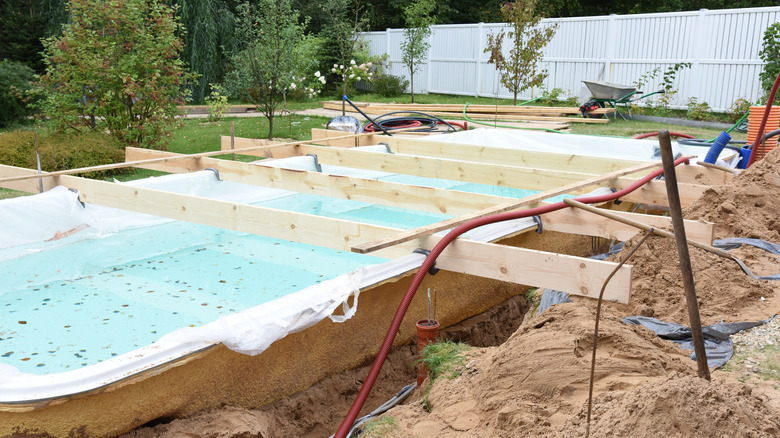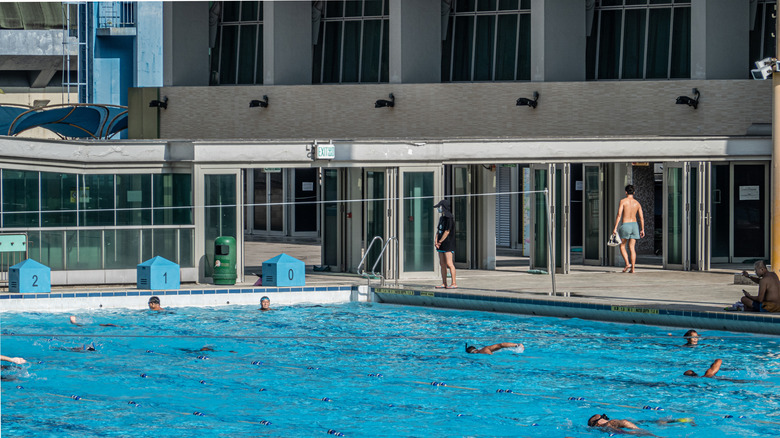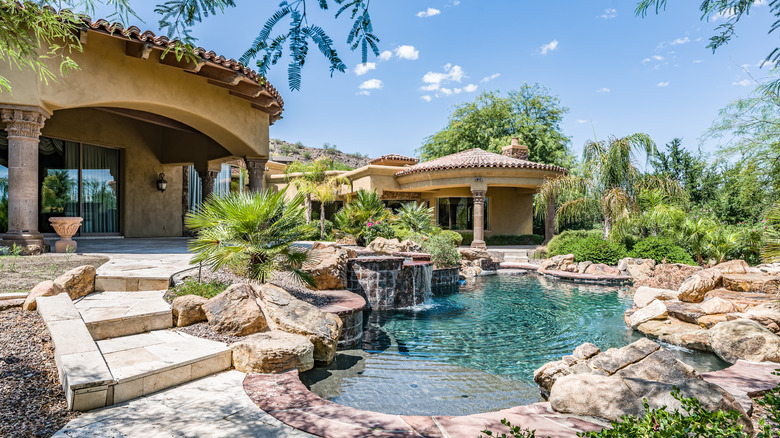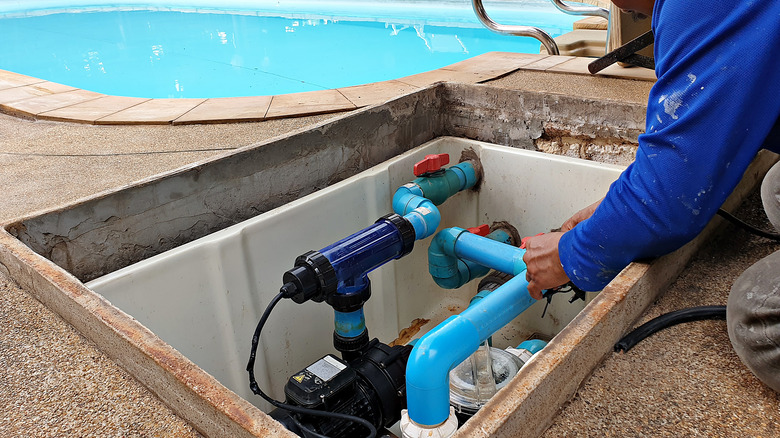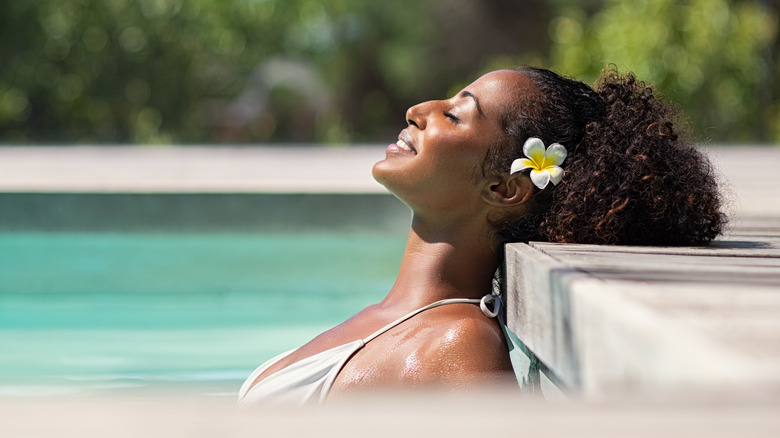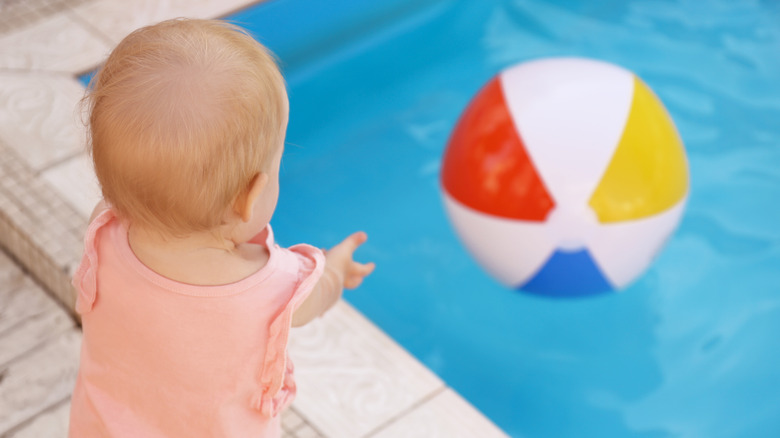How Much Does It Cost To Build An Inground Pool?
Installing a swimming pool in your own yard is an option many of us have dreamed about. Far more common in different regions of the United States than in others, an inground swimming pool offers the convenience of a staycation with the luxury of a day of swimming in clear, warm water. The cost of one of these pools can vary greatly depending on many factors such as the shape of the pool, the material used in construction, costs of labor and permitting, costs of landscaping and decking, filtration systems, and of course, location.
To understand how much a pool will truly cost for your own home, you'll need to consider these different factors and do the math for the total amount. The experts at Bob Vila can help a little, noting the small pools tend to range from $20,000 to $30,000 and large pools usually start at $40,000 and increase from there with an average cost of around $10 per cubic foot as of March 2021. While expensive, homeowners should also look at the savings associated with external expenses for entertainment and recreation to get a holistic picture, as well as the cost difference between and above-ground and in-ground option.
Factors for cost
The cost of an installed pool varies greatly, according to River Pools and Spas.
Location of property
Home Advisor notes that installation costs also vary greatly by location. For example, average pool build costs for the Tri-state New York region are $20,000 to $37,000 while average costs for the Phoenix metro are $9,500 to $32,000. Labor costs in your region as well as climate-related construction issues can significantly change your budget.
The Neave Group elaborates on the cost of heating a pool — a necessity for colder climates. Citing one example, it is expected to cost $1,448 annually to warm an outdoor pool to a balmy 78 degrees in New York. This cost drops to an average of $300 with an effective pool cover. Using a heat pump instead of traditional gas can reduce annual costs to $740 uncovered and $150 covered. Additional heating solutions such as solar power may also change your operating costs.
Seasonal maintenance costs
How much more depends not only on pool size and build but whether you plan to leave your pool open for the winter like an Icelandic "hot pot," of if you'd prefer to weatherize and close it down for the season. If you choose to close down your pool for the season, you can help avoid burst fixtures and damage from frozen pipes. Kompareit suggests winterization costs run from $125 to $375 yearly, while Fixr advises seasonal opening costs usually run around $225 annually, with professional rates going as high as $400.
Pool cost by size
Pool size is often broken down by category with small pools under 27 feet long ranging to large pools 35 feet long or more.
Pool cost by material
Beginning with turnkey pricing for "purchase and go" options, the average fiberglass pool may cost $55,000 to $85,000, a vinyl pool can run $35,000 to $65,000, and a concrete pool will be closer to $50,000 and $100,000. The Spruce mentions that pools can also be made out of alternative finishes like Jewelscapes or Beadcrete, but data varies more widely on turnkey costs for these items.
Pool cost by build and installation
Forbes details additional costs that must be calculated with any pool beyond simple materials. If rental equipment is required such as a crane, costs run from $2,400 to $2,800 and excavation alone can cost $400 to $1,500. Disposal of excess dirt can really add up to as much as $13,000 unless you have a side project planned such as an earthbag escape. Permits generally run from $200 to $300 and pool equipment average around $1,000 or more as previously detailed. Landscaping costs can be another highly variable part of pool installation, ranging from $100 to $45,000.
Additional costs
Pool costs by filtration system
Swimming pool costs aren't limited by location, pool type, and seasonal maintenance, but also by the type of water filtration system you use to keep your pool sparkling clean. Fixr estimates the average cost to install a pool filter ranges from $500 to $2000 — a rather large variance. With a national average of $975, the exact cost will depend on filter type and pool size.
Cartridge filters are prebuilt for easy assembly but can be difficult to take apart and clean. Prices range from $200 to $1,600 effective for particulates as tiny as 10 to 15 microns. Silica sand filters are effective for particle sizes 20 microns to 100 microns and cost between $250 and $1,200. Glass filters are a newer sand alternative and filter very fine particles as small as 9 microns, costing between $500 to $1500. Diatomaceous earth filters are top-of-the-line for extra clean water, filtering particles as small as 3 to 5 microns and costing $520 to $1,600.
Pool costs by custom features
Add-ons are another factor that will change the cost of your installation, such as in-pool steps, waterslides, and added features like a hot tub.
Types of inground swimming pools
The Spruce describes several primary types of swimming pools, but there are always customizations beyond this. By pool type we aren't referring to shape, as modern curves work similarly to older angular designs with most materials.
Concrete-based pools
Highly popular are concrete-based inground pools. These pools are built using rebar to line the pool area then a layer of a type of wet concrete called shotcrete is added or a dry type of concrete called gunnite.
Fiberglass pools
Fiberglass pools use pre-fabricated pool liners which allow for quick installation but there may be potentially difficult maintenance after around 10 to 15 years. Think of many popular hot tub designs when considering fiberglass.
Vinyl pools
Vinyl pools utilize a vinyl pool liner which consists of prefabricated steel or aluminum walls and a sandy base layer with a vinyl liner held in place.
Chlorine vs. saltwater pools
Fixr also notes the choice between a traditional chlorine and a saltwater pool. Saltwater costs run between $70 to $100 per year for salt and chemicals while chlorine runs from $300 to $800 per year in chemical costs. Saltwater systems have a higher upfront installation costs but lower year-round maintenance than their traditional chlorine counterparts, but they do need regular checks and maintenance on the generator cells for electrolysis filtration.
Why you need an inground swimming pool
Why not build an inground swimming pool should really be the question.
Entertainment and enjoyment
For homeowners who have a pool in their budget, adding this feature to your home will provide hours of entertainment and enjoyment. Homeowners with a pool will save on many of the costs associated with swimming elsewhere such as seasonal passes, snack bar fees, and time and gas to drive across town. Entertaining becomes more fun with floaties too (at least in our opinion).
Health benefits
As for your health, swimming is an excellent exercise that can support your well being. Per Better Health, you can build muscles and endurance while promoting a healthy weight and healthy heart, too. Because swimming uses so many parts of your body it provides a total body workout which many enjoy for its low-impact and potential high intensity. Swimming has also been known to promote better flexibility, improved posture, and reduced stress. Plus, on a hot summer day — you'll have a wonderful way to cool down.
Benefits and risks of installing an inground pool
There are both benefits and risks when it comes to installing an inground pool.
Increased home value
While pools can increase some costs, they have also been reported to increase home value and appeal to new buyers. Bankrate shares that many real estate services report increased property values of around 7%, and can add value in the tens of thousands in warmer climates. However, consider the liability involved in owning an inground pool, especially in an area accessible to small children.
Pool costs related to insurance and liability
A typical homeowners policy includes around $100,000 in medical and liability coverage, but those with a pool may seek larger amounts such as $500,000 according to some experts. Protecting your home (and pool) may also come with stipulations from your insurance than increase installation costs such as specialized locks, security fences, or limitations on slides and other features.
Pool costs and energy rates
At worst, some insurance companies may deny coverage for any pool-related incidents. Think Progress also notes the impact of owning an inground pool on your energy rates, sharing that homes with these features use 49% more energy each year (an average of about $500). Water costs are likely to increase according to pool size as well.
